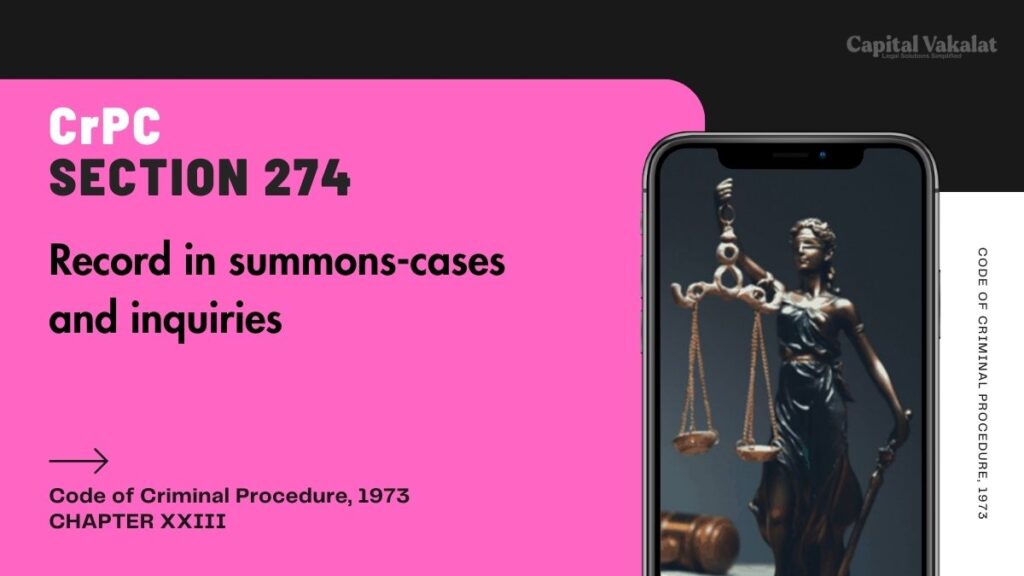The Criminal Procedure Code (CrPC) serves as the backbone of the criminal justice system in India. It outlines the procedural laws to be followed during criminal proceedings, ensuring a standardized process for the administration of justice.

Among its many sections, Section 274 holds a significant place, particularly in the context of summons-cases and inquiries.
Bare Act. Section 274 Cr.P.C.
Record in summons-cases and inquiries.
(1) In all summons-cases tried before a Magistrate, in all inquiries under sections 145 to 148 (both inclusive), and in all proceedings under section 446 otherwise than in the course of a trial, the Magistrate shall, as the examination of each witness proceeds, make a memorandum of the substance of the evidence in the language of the Court:
Provided that if the Magistrate is unable to make such memorandum himself, he shall, after recording the reason of his inability, cause such memorandum to be made in writing or from his dictation in open Court.
(2) Such memorandum shall be signed by the Magistrate and shall form part of the record.
Understanding Summons-Cases and Inquiries
Definition and Scope of Summons-Cases
Summons-cases are relatively straightforward proceedings involving offenses that are less severe compared to warrant-cases. They are typically initiated by a summons issued to the accused, directing them to appear in court. The inquiry process in summons-cases focuses on fact-finding and the determination of whether sufficient evidence exists to proceed with a trial.
Historical Context of Section 274 CrPC
Evolution of Record-Keeping Laws
The tradition of meticulous record-keeping in legal proceedings has deep roots. Historically, the accuracy and integrity of legal records were crucial for ensuring justice. Over the years, the CrPC has evolved to incorporate comprehensive guidelines for recording evidence and proceedings, culminating in the establishment of Section 274.
Legal Framework of Section 274 CrPC
Detailed Provisions of Section 274
Section 274 of the CrPC mandates that, in summons-cases and inquiries, the evidence must be recorded in a summary form by the presiding magistrate. This provision aims to streamline the documentation process, ensuring that essential details are captured without overburdening the court system with voluminous records.
Importance of Accurate Record-Keeping
Legal Obligations and Implications
Accurate record-keeping under Section 274 is not just a procedural formality; it holds significant legal implications. Proper documentation ensures transparency, accountability, and the fair administration of justice. It also serves as an essential reference for appellate courts and future legal proceedings.
Procedural Aspects of Section 274 CrPC
Steps Involved in Recording Proceedings
The process of recording proceedings under Section 274 involves several key steps:
- Summarizing the evidence presented.
- Ensuring clarity and accuracy in the recorded information.
- Maintaining a consistent format to facilitate easy reference.
- Verifying the records for completeness and correctness before signing them.
Role of the Magistrate in Summons-Cases
Duties and Responsibilities
The magistrate plays a pivotal role in summons-cases, acting as both a recorder of evidence and an adjudicator. Their responsibilities include ensuring that all pertinent details are accurately captured and that the rights of the accused are protected throughout the inquiry.
Comparative Analysis with Other Jurisdictions
Global Perspectives on Record-Keeping
Examining how other jurisdictions handle record-keeping in legal proceedings can provide valuable insights. Many countries have adopted advanced technological solutions to streamline their processes, highlighting the potential for innovation within the Indian legal system.
Challenges in Implementing Section 274 CrPC
Practical Issues Faced by Courts
Despite its clear guidelines, the implementation of Section 274 faces several challenges. These include limited resources, varying levels of magistrate training, and the sheer volume of cases. Addressing these issues is crucial for ensuring the effectiveness of this provision.
Technological Advancements in Record-Keeping
Digital Solutions for Legal Records
With the advent of digital technology, there is immense potential to revolutionize record-keeping in legal proceedings. Electronic records, automated transcription services, and secure digital storage can enhance the efficiency and accuracy of legal documentation under Section 274.
Case Studies Illustrating Section 274 CrPC
Real-Life Applications and Outcomes
Real-life case studies demonstrate the practical application and impact of Section 274. These examples highlight how accurate record-keeping has facilitated fair trials, influenced appellate decisions, and underscored the importance of adhering to legal protocols.
Best Practices for Legal Practitioners
Ensuring Compliance with Section 274
Legal practitioners play a crucial role in upholding the standards set by Section 274. Best practices include thorough training in record-keeping, regular audits of records, and the adoption of technological tools to assist in maintaining accurate and comprehensive documentation.
Future Prospects of Section 274 CrPC
Potential Reforms and Developments
The future of Section 274 lies in its potential for reform and adaptation. As the legal landscape evolves, so too must the provisions for record-keeping. Anticipated developments include legislative amendments, enhanced training programs, and greater integration of technology in legal processes.
Public Awareness and Legal Literacy
Educating Citizens about Their Rights
Raising public awareness about Section 274 and its implications is vital. Legal literacy programs can empower citizens, helping them understand their rights and the importance of accurate record-keeping in the justice system. This, in turn, fosters greater trust in legal institutions.
Section 274 CrPC: Record in Summons-Cases and Inquiries
Understanding the Core of Section 274 CrPC
At its core, Section 274 CrPC is about ensuring that justice is served through accurate and efficient record-keeping. This provision underscores the importance of meticulous documentation in legal proceedings, particularly in summons-cases and inquiries, where the details captured can significantly impact the outcome of the case.
Conclusion
Summary and Final Thoughts
Section 274 of the CrPC is a cornerstone of the legal framework governing summons-cases and inquiries in India. Its emphasis on accurate and efficient record-keeping ensures that justice is both served and seen to be served. By understanding its provisions, challenges, and potential for future developments, legal practitioners and citizens alike can contribute to a more transparent and effective judicial system.